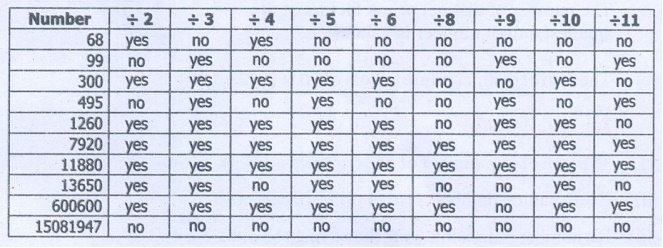Numbers | Term 2 Chapter 1 | 6th Maths - Rules for Test of Divisibility of Numbers | 6th Maths : Term 2 Unit 1 : Numbers
Chapter: 6th Maths : Term 2 Unit 1 : Numbers
Rules for Test of Divisibility of Numbers
Rules
for Test of Divisibility of Numbers
Suppose that, you are asked to simplify a fraction
say 126/216 . Since the numbers are relatively bigger, the task is not easy. Observe
that, these numbers are not only divisible by 2 and 9 exactly but by other numbers
too! How do we know that 2 and 9 are factors of 126 and 216? We are going to see
divisibility tests in this section
which are rules that will improve your mental math skills for such determinations.
Divisibility tests, in common, are useful in the
prime factorisation of a number. Also, it is fun to find whether any large number
is exactly divisible by 2, 3, 4, 5, 6, 7, 8, 9, 10 or 11 (and more...) by simply
observing, examining and performing basic operations with the digits of the given
number and not by doing the actual division Curious to know? Then, remember the
following interesting rules and have fun...! As divisibility by 2, 3 and 5 gain
importance in the prime factorisation of a number, we will define the rules for
them first!
Divisibility by 2
A number is divisible
by 2, if its ones place is any one of the even numbers 0, 2, 4, 6 or 8.
Examples:
1. 456368 is divisible
by 2, since its ones place is even(8).
2. 1234567 is not divisible
by 2, since its ones place is not even(7).
Divisibility by 3
Divisibility of a number by 3 is interesting! We
can find that 96 is divisible by 3. Here, note that the sum of its digits 9+6 =
15 is also divisible by 3. Even 1+5 = 6 is also divisible by 3. This is called as
iterative or repeated addition. So,
A number is divisible
by 3 if the sum of its digits is divisible by 3.
Examples:
1. 654321 is divisible
by 3.
Here 6+5+4+3+2+1= 21 and 2+1=3 is divisible by 3.
Hence, 654321 is divisible by 3.
2. The sum of any three
consecutive numbers is divisible by 3.
(For example: 33+34+35=102, is divisible by 3)
3. 107 is not divisible by 3 since 1+0+7=8, is not
divisible by 3.
Divisibility by 5
Observe the multiples of 5. They are 5, 10, 15,
20, 25,.., 95, 100, 105, …., and keeps on going.
It is clear, that multiples of 5 end either with
0 or 5 and so,
A number is divisible
by 5 if its ones place is either 0 or 5.
Examples: 5225 and 280 are divisible by 5
Try these
(i) Are the leap years divisible by
2?
Yes. The leap years are
divisible by 2.
(ii) Is the first 4 digit number divisible
by 3?
The first 4 digit number 1000
It is not divisible by 3.
(iii) Is your date of birth (DDMMYYYY)
divisible by 3?
Date of Birth 09−06−2007.
It is divisible by 3.
(iv) Check whether the sum of 5 consecutive
numbers is divisible by 5.
The sum of 5 consecutive numbers is divisible 5
1 + 2 + 3 + 4 + 5 = 15/5
= 3
16 + 17 + 18 + 19 + 20 = 90/5 = 18
(v) Identify the numbers in the sequence
2000, 2006, 2010, 2015, 2019, 2025 that are divisible by both 2 and 5.
The numbers divisible by 2 are 2000, 2006, 2010
The numbers divisible by 5 are 2000, 2010, 2015
Divisibility by 4
A number is divisible
by 4 if the last two digits of the given number is divisible by 4.
Note that if the last two digits of a number
are zeros, then also it is divisible by 4.
Examples: 71628, 492,
2900 are divisible by 4, because 28 and 92
are divisible by 4 and 2900 is also
divisible by 4 as it has two zeros.
Divisibility by 6
A number is divisible
by 6 if it is divisible by both 2 and 3.
Examples: 138, 3246, 6552 and 65784 are divisible by 6.
Note
Though a rule for divisibility of a number
by 7 exists, it is a bit tricky and dividing directly by 7 will be easier.
Divisibility by 8
A number is divisible
by 8 if the last three digits of the given number is divisible by 8.
Note that if the last three digits of a number
are zeros, then also it is divisible by 8.
Examples: 2992 is divisible by 8 as 992 is divisible by 8 and 3000 is divisible by 8 as its last three
digits are zero.
Divisibility by 9
A number is divisible
by 9 if the sum of its digits is divisible by 9. Note that the numbers divisible by 9 are
divisible by 3.
Examples: 9567 is divisible by 9 as 9+5+6+7=27 is divisible by 9.
Divisibility by 10
A number is divisible
by 10 if its ones place is only zero. Observe that numbers divisible by 10 are also divisible by 5.
Examples:
1. 2020 is divisible
by 10 (2020÷10 = 202) where as 2021 is not divisible by 10.
2. 26011950 is divisible
by 10 and hence divisible by 5.
Divisibility by 11
A number is divisible
by 11 if the difference between the sum of alternative digits of the number
is either 0 or divisible by 11.
Examples: Consider the number 256795. Here, the difference between the sum of alternative
digits = (2+6+9 )−(5+7+5)=17−17=0.
Hence, 256795 is divisible by 11.
Activity
The teacher may ask all the students
to check mentally for divisibility by 2, 3, 4, 5, 6, 8, 9, 10 and 11. If divisible,
let them write ‘yes’, otherwise ‘no’ (the first one is done for you!).

Related Topics